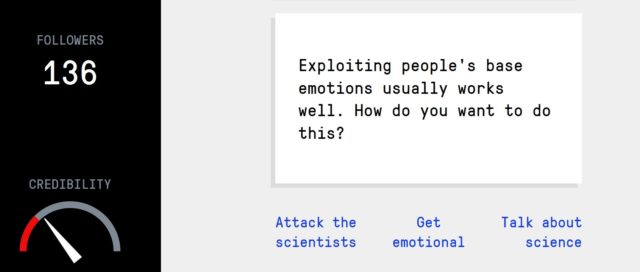
A fake news “vaccine” has been launched in the form of an online game that aims to make people misinformation-savvy by revealing the tricks used by media truth-twisters.
Players take on the role of fake news producers and score points by winning followers for their conspiracy theories and angry tweets.
Research has shown that exposing people to propaganda tactics can psychologically “inoculate” them against the influence of real fake news.
 Donald Trump has hit out at the “fake news media” while being accused himself of spreading misinformation (Matt Cardy/PA)
Donald Trump has hit out at the “fake news media” while being accused himself of spreading misinformation (Matt Cardy/PA)
The free game, from a team of social scientists at Cambridge University, is intended to combat a growing epidemic of misinformation said to be sweeping across social media and online news outlets.
Dr Sander van der Linden, director of Cambridge University’s Social Decision-Making Laboratory, said: “A biological vaccine administers a small dose of the disease to build immunity. Similarly, inoculation theory suggests that exposure to a weak or demystified version of an argument makes it easier to refute when confronted with more persuasive claims.
 Screenshot taken from the Fake News Game. (DROG/PA)
Screenshot taken from the Fake News Game. (DROG/PA)
“If you know what it is like to walk in the shoes of someone who is actively trying to deceive you, it should increase your ability to spot and resist the techniques of deceit.
“We want to help grow ‘mental antibodies’ that can provide some immunity against the rapid spread of misinformation.”
The game can be downloaded from the website fakenewsgame.org.
Players set up fake news websites and are encouraged to manipulate public reaction to thorny topics such as climate change and genetic engineering.
The game works at different levels, involving both bizarre made-up conspiracy theories – one being the claim that dinosaurs built the pyramids – and misinformation with a genuine history.
An example of the latter is the conspiracy theory surrounding Agenda 21, a non-binding sustainable development action plan proposed by the United Nations in 1992.
The apparently innocent document sparked a cultish belief in some circles that it was the start of a plot to establish an eco-totalitarian world government.
Jon Roozenbeek, another member of the Cambridge team, said: “This really happened. The game shows how ridiculous it is.”
Players build up audiences on their fake news sites by publishing “polarising falsehoods”, deploying twitter bots, photo-shopping evidence, and challenging the “facts” behind public tragedies while maintaining a high “credibility score”.
Mr Rozenbeek added: “For sure, fake news is a large problem, especially in the online environment.
“Propaganda is nothing new, but now it’s easier than ever for someone with malicious intent to set up a website and spread misinformation.
“What we’re doing is attempting to fix this at an individual level by making news consumers more aware of what’s happening.”
A pilot study in the Netherlands tested a paper version of the game on 95 students, focusing on the refugee crisis.
Players were tasked with distorting a government fact sheet on asylum seekers to produce fake news articles. They were found to be less easily taken in by fabricated news reports presented at the end of the experiment than students who had not played the game.
The study findings have been accepted for publication in the Journal of Risk Research.


Why are you making commenting on The Herald only available to subscribers?
It should have been a safe space for informed debate, somewhere for readers to discuss issues around the biggest stories of the day, but all too often the below the line comments on most websites have become bogged down by off-topic discussions and abuse.
heraldscotland.com is tackling this problem by allowing only subscribers to comment.
We are doing this to improve the experience for our loyal readers and we believe it will reduce the ability of trolls and troublemakers, who occasionally find their way onto our site, to abuse our journalists and readers. We also hope it will help the comments section fulfil its promise as a part of Scotland's conversation with itself.
We are lucky at The Herald. We are read by an informed, educated readership who can add their knowledge and insights to our stories.
That is invaluable.
We are making the subscriber-only change to support our valued readers, who tell us they don't want the site cluttered up with irrelevant comments, untruths and abuse.
In the past, the journalist’s job was to collect and distribute information to the audience. Technology means that readers can shape a discussion. We look forward to hearing from you on heraldscotland.com
Comments & Moderation
Readers’ comments: You are personally liable for the content of any comments you upload to this website, so please act responsibly. We do not pre-moderate or monitor readers’ comments appearing on our websites, but we do post-moderate in response to complaints we receive or otherwise when a potential problem comes to our attention. You can make a complaint by using the ‘report this post’ link . We may then apply our discretion under the user terms to amend or delete comments.
Post moderation is undertaken full-time 9am-6pm on weekdays, and on a part-time basis outwith those hours.
Read the rules hereLast Updated:
Report this comment Cancel